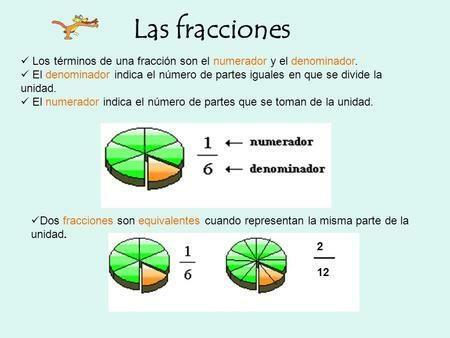Numerator and denominator of a FRACTION

We are glad to be able to bring a new lesson from a Teacher in the area of mathematics in which you will understand what the numerator and denominator of a fraction with examples, basic knowledge to be able to operate later with those fractions. To begin with, we will remember what the numerator is and what the denominator is and we will see examples so that everything is understood correctly. Finally, we will see exercises with their respective solutions.
Index
- What is the numerator of a fraction
- What is the denominator of a fraction
- Examples of numerator and denominator of a fraction
- Exercises of numerator and denominator of a fraction
- Solutions
What is the numerator of a fraction.
The numerator is the number we find in the top of a fraction or, what is the same, the number of parts selected from a whole. You can make it any whole number.
When the numerator is smaller than the denominator, we are faced with a proper fraction, while when the numerator is greater than the denominator, it is called improper fraction.
If multiple fractions have the same numerator, the one with the smallest denominator will have the largest value.
What is the denominator of a fraction.
The denominator is heto bottomr of any fraction. It can also be defined as the number of equal parts into which a unit is divided. It is a key element, because it is used for countless things. One of the cases in which the denominator must be taken into account is when performing operations with fractions. In addition, we must take into account that the denominator cannot be the number 0.
As a curiosity, denominator comes from the Latin "denominator", which translates as "the one who gives the name below", since de- is a prefix which refers to the direction down, -nomen- refers to nominate, and -tor refers to the agent that performs the action.
If multiple fractions have the same denominator, the one with the larger numerator will have a larger value.

Examples of numerator and denominator of a fraction.
Let's see with examples numerator and denominator of a fraction:
- If we have the fraction 4/8, the numerator is 4 and the denominator is 8. It is a proper fraction, because the numerator is smaller than the denominator.
- In the fraction 6/7, 6 is the numerator and 7 is the denominator. It is a proper fraction, for the same reason as the previous one.
- In the fraction 5/3, 5 is the numerator and 3 is the denominator. We are facing an improper fraction, since the numerator is larger than the denominator.
On the other hand, if we have the fractions 5/7, 5/9 and 5/15, in which they all have the same numerator:
- The fraction with a larger value will be 5/7, since it is the one with a smaller denominator.
- The next one with a higher value, but less than the first, would be 5/9, since it is the one with the second smallest denominator.
- Finally, the fraction with the smallest value would be 5/15, since it is the one with the largest denominator.
For the case of fractions with the same divisor, we can see that 3/7, 8/7 and 5/7:
- The fraction with the highest value would be 8/7, since it is the one with the highest numerator.
- The next would be 5/7, since it is the second with the highest numerator.
- The fraction with the smallest value would be 3/7, since it has a very small numerator.
Exercises of numerator and denominator of a fraction.
Let's check if you have understood what has been explained throughout this lesson, through the following exercises:
1. Identify the numerators and denominators of the following fractions:
- 7/3
- 12/5
- 1/4
2. Order the following fractions from least to greatest:
- 3/7, 3/13, 3/8
- 5/8, 9/8, 2/8
Solutions.
The solutions to the activities proposed in the upper section are:
1. Identify the numerators and denominators of the following fractions:
- 7/3: 7 is the numerator and 3 is the denominator.
- 12/5: 12 is the numerator and 5 is the denominator.
- 1/4: 1 is the numerator and 4 is the denominator.
2. Order the following fractions from least to greatest:
- 3/7, 3/13, 3/8: 3/13 < 3/8 < 3/7
- 5/8, 9/8, 2/8: 2/8 < 5/8 < 9/8
If you have found this lesson useful, you can browse the tabs of a Teacher's website and find many more related to mathematics. Do not forget to share us with your classmates and classmates!

If you want to read more articles similar to Numerator and denominator of a fraction - with examples, we recommend that you enter our category of Arithmetic.

